The British Broadcasting Century with Paul Kerensa
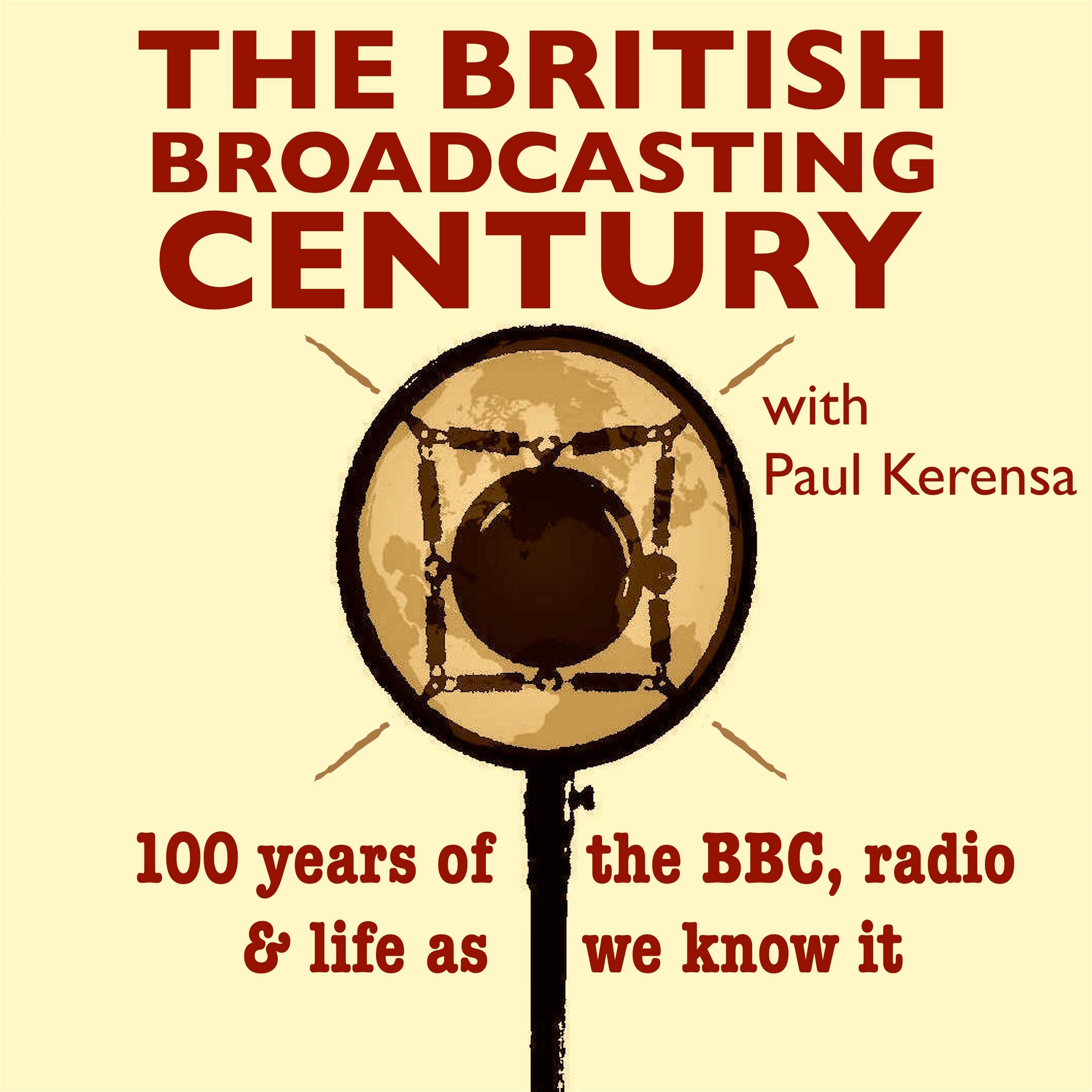
100 Years of the BBC, Radio and Life as We Know It. Be informed, educated and entertained by the amazing true story of radio’s forgotten pioneers. With host Paul Kerensa, great guests and rare archive from broadcasting’s golden era. Original music by Will Farmer. www.paulkerensa.com/oldradio
100 Years of the BBC, Radio and Life as We Know It. Be informed, educated and entertained by the amazing true story of radio’s forgotten pioneers. With host Paul Kerensa, great guests and rare archive from broadcasting’s golden era. Original music by Will Farmer. www.paulkerensa.com/oldradio
Episodes
Episodes
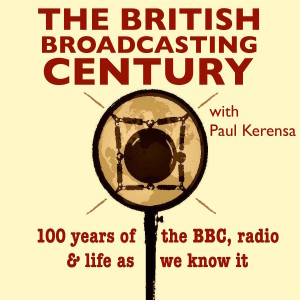


Thursday Mar 16, 2023
#064 Farewell Magnet House, Hello... Laundry Baskets? + Jeffrey Holland
Thursday Mar 16, 2023
Thursday Mar 16, 2023
Episode 64 dwells in 1st-16th March 1923: the last days of the first BBC HQ of Magnet House.
So this packed show takes a walk from Magnet House to the studios at Marconi House, just as the early broadcasters would have done. We take a look at the early broadcasting philosophy of first staff - "the upper side of taste" (no grizzly murders or divorce cases).
We revisit broadcasts from the Daily Mail Ideal Home Exhibition and head on tour with a laundry basket packed with sheet music (just don't send it to the laundrette like they did).
Hear the voices of a few who were there: Rex Palmer, Peter Eckersley, Arthur Burrows, Cecil Lewis, A.E. Thompson, Percy Edgar, Leonard Crocombe... that's about 10% of the entire BBC workforce at the time! You'll also hear a bit from Radio 4's Justin Webb...
...our main special guest is JEFFREY HOLLAND, star of Hi-de-Hi, You Rang M'Lord, Oh Doctor Beeching... and he tells how he even played Private Pike AND Private Walker onstage with the original Dad's Army cast of Arthur Lowe, John Le Mesurier and Clive Dunn.
It's a packed episode, but then a lot happened in early March 1923! Next time, late March 1923... Stay tuned to this frequency.
LINKS:
Find out more about Jeffrey Holland's tour as Stan Laurel at https://www.jeffreyholland.co.uk/
For more on Leonard Crocombe/Justin Webb, here's our previous episode of the podcast about grandfather and grandson, both BBC stars 100 years apart: https://pod.fo/e/120761
The complete Leonard Crocombe record can be heard on AusRadioHistorian's Youtube channel: https://youtu.be/6N1-hGjP_2M
London Calling, Jimmy Perry's 1922-set sitcom about the early BBC starring Jeffrey Holland, can be heard on Youtube: https://youtu.be/qFSTtd69U_0
For the full video of my walk from Magnet House to Marconi House (as was), join us on Patreon - join then cancel if you like! Here's the video: https://www.patreon.com/posts/magnet-house-to-68777192
...that all helps support the podcast and keeps us in books and web hosting. One-off tips delightfully welcomed too! At http://ko-fi.com/paulkerensa
I'm booking in a mini-tour this year recreating the first religious broadcast, and/or a more general talk/show/presentation An Evening of (Very) Old Radio. More info at https://www.paulkerensa.com/tour or just email me on https://www.paulkerensa.com/contact.php - you can use that for any podcast comments, heckles, anecdotes etc too. We must bring back Airwave Memories/Firsthand Memories too. Record a thing or write some words about your early broadcast memories, if you like. Get in touch!
Oh and we're nothing to do with the BBC. Did I mention that? BBC content is used with kind permission, BBC copyright content reproduced courtesy of the British Broadcasting Corporation. All rights reserved.
Original music is by Will Farmer.
Next time we'll have the tale of late March with the first daily weather broadcasts, SOSs and an interview with a former BBC archivist.
...Subscribe so you don't miss it!
www.podfollow.com/bbcentury



Monday Mar 06, 2023
#063 Glasgow 5SC: The BBC Launches in Scotland
Monday Mar 06, 2023
Monday Mar 06, 2023
On episode 63, we've reached 6th March 1923: Glasgow 5SC launches - the BBC's first station in Scotland.
It's not Scotland's first radio station (see episode 48 for the tale of how Daimler, Glasgow Motor Show and a couple of electrical shop owners made a couple of pre-BBC pop-up stations).
But this sixth BBC station mattered to John Reith more than any other. He'd grown up in Glasgow. His mum came to visit the radio station. He opened the station himself - apart from the bagpipes playing Hey Johnny Cope.
You have two fantastic guides through this episode:
GRAHAM STEWART, a BBC journalist whose new book Scotland On-Air is out very soon. Details at https://wiki.scotlandonair.com/wiki/Main_Page
+
TONY CURRIE, of Radio Six International, and author of The Radio Times Story. Details at https://www.radiosix.com/
SHOWNOTES:
- I mention an early 1980s children's retrospective that Kathleen Garscadden appears on. It's called Jubilee! 60 Years of Children's Programmes, it's from 1983, it's got Floella Benjamin, Sarah Greene, Mike Read, Keith Chegwin. Tony Hart and many more, including Auntie Cyclone herself, it's fab, and it's here to watch: https://youtu.be/tNZD70HiFsw
- My novel on all this, Auntie and Uncles, is out soon! But not yet. Depending when you read this. More info may be here, unless I've missed Amazon's deadline to upload it, in which case Jeff Bezos might delete this from sale. But it will return! When ready. It's going to be great... https://amzn.to/3EODANc
- Support us on www.patreon.com/paulkerensa to keep us afloat and in return get extra writings, videos and ample more! Thanks to all who support us there.
- We're on www.facebook.com/groups/bbcentury, where our Newspaper Detective Andrew Barker is chronicling newspapers on this day 100 years ago.
- Follow us on www.twitter.com/bbcentury, where I post LOTS of old radio things.
- More on this entire project at www.paulkerensa.com/oldradio
- This is not a BBC podcast - we're talking about them (though very much from a favourable viewpoint), not with them.
- BBC content is used with kind permission of the British Broadcasting Corporation. All rights reserved...
- ...and preserved. This podcast is the origin story of British broadcasting, told the very slow way - but hopefully in a way that informs, educates and (winks, clicks fingers like the Fonz) entertains.
Next time: We're still in March 1923 (a lot happened in March 1923) with broadcasts from the Ideal Home Exhibition, tales of touring variety acts around the early BBC stations, and a fab guest in Hi-de-Hi's Jeffrey Holland.
Subscribe to get this podcast as soon as one's uploaded - we plan on being here a while yet: www.podfollow.com/bbcentury



Wednesday Feb 22, 2023
#062 Radio’s First Political Debate... and Reeta Chakrabarti
Wednesday Feb 22, 2023
Wednesday Feb 22, 2023
On 22 February 1923, the BBC tried something new: the first broadcast political debate. What could possibly go wrong? Let's find out!
And we chat to Reeta Chakrabarti - a mainstay of BBC news for over 30 years. She's anchored news from the studio, broadcast from Ukraine, and recently voiced radio pioneer Hilda Matheson on the BBC100 Prom. We talk about her career highlights and the place of BBC journalism in the world today.
Back in 1923, we're telling the origin story of British broadcasting, landmark moment by landmark moment, so this episode includes:
That first political debate: Sir Ernest Benn and J.T. Walton Newbold MP on "That Communism would be a Danger to the Good of the People” - but the audience are a little one-sided, and bring not only heckles but a rousing musical finale - The Red Flag. There are complaints... Thanks to the press of the day, we recreate the key moments of that first political debate for (we presume) the first time ever.
Back at HQ, Caroline Banks joins to head up the female clerical staff.
The BBC listings ban continues in the press.
Pip, Squeak and Wilfred make the jump from a Daily Mirror cartoon strip to on-air children's programme.
The launch of Musical, Dramatic, Literary and Film Talks.
The first broadcast in Welsh (hear Rev Gwilym Davies).
The first daytime programmes... and more.
It was quite a week!
Next time: Early March 1923, the BBC gains its sixth station and Scotland gains official broadcasting, as Glasgow 5SC launches. We'll bring the speeches and juicy details.
Support us? £5/mth on Patreon.com/paulkerensa keeps us going.
And/or share this if you like it - find us fresh ears!
We're on Facebook and Twitter, and a reminder that this is nothing to do with the BBC. It's a one-man non-BBC project.
Part of that also includes Paul's new novel, Auntie and Uncles: The Bizarre Birth of the BBC (out this spring, ish): https://amzn.to/3ZsF335
Another part is Paul's live show on early radio: this year that includes 'The Beeb: Year 1 - 1923 Repeated' (a stand-up history show whizzing through that first year) + a re-enactment of the first religious broadcast. To book either, or with any comments on the podcast, get in touch.
Subscribte/Rate/Review if you like this episode - thanks!
paulkerensa.com



Saturday Feb 11, 2023
#061 The BBC’s Listings Ban... and Gareth Gwynn’s Ministry of Happiness
Saturday Feb 11, 2023
Saturday Feb 11, 2023
Welcome to Season 5!
Centenary specials behind us, we deep-dive back into mid-Feb 1923, in our moment-by-moment story of British broadcasting's birth.
On episode 61, we hear from:
GARETH GWYNN on his new sitcom on the launch of broadcasting in Wales, The Ministry of Happiness (catch it on BBC Sounds)...
ANDREW BARKER on the BBC listings ban...
and DAVID JERVIS on his grandfather 'The Tame Wizard', Capt H.J. Round. Hear an excerpt here, or the full section in David's recording on Youtube.
And some of the landmark moments we cover include:
Feb 13th: Cardiff 5WA launches - hear clips from The Ministry of Happiness, including a sneak-peek of episode 2.
Feb 14th: The Pall Mall Gazette stops printing BBC listings, after a feud between press + broadcasters. Our Newspaper Detective will tell you what, why and when.
Feb 15th: The listings ban comes in...
Feb 16th: As Shakespeare is first broadcast, one of The Pall Mall Gazette's most famous advertisers comes to the rescue.
Feb 17th: The first broadcast appeal, for the Winter Distress League.
Feb 20th: Sir Oliver Lodge broadcasts... and John Reith battles the press, and gets an idea in the process. The Radio Times idea is born.
Subscribe, share, rate, review, tell your friends, join us on Facebook, Twitter and Patreon - and thanks if you support us there.
...There on Patreon you can have Cecil Lewis' Broadcasting from Within read to you (with explanatory interruptions). Hear an extract this episode from the grandson of the chap being mentioned.
FINAL THINGS:
- Paul's new novel Auntie and Uncles will be out this Spring. Hopefully. That date may shift. Still writing it. Details: https://amzn.to/3zIY9Hq
- Paul's got two touring showatunities this year - dates TBC but for now we want BOOKINGS! The First Religious Broadcast: Re-enacted... AND The Beeb: Year 1 are both available. Fancy either at your place? A village hall? A church? A club/group/society? Get in touch: https://www.paulkerensa.com/contact.php
- Oh and we're nothing to do with the BBC. Never heard of them.
Next time we'll pick up the tale on February 22nd, for the BBC's first political debate (it doesn't go to plan), and guest Reeta Chakrabarti. Don't miss it.
podfollow.com/bbcentury



Saturday Jan 28, 2023
#060 A History of Religious Broadcasting: 100 Years of God on the Beeb
Saturday Jan 28, 2023
Saturday Jan 28, 2023
In the beginning... religious broadcasts were there ever since Marconi said, "Let there be sound!" (He never said that.)
Whether you're a faithful or heathen, you're very welcome here and I think you'll enjoy this whizz through a century of British broadcasting blessings (and some early US ones too) - including some very rare clips and new discoveries of old things/names/juicy geeky details.
From Reginald Fessenden's violin to Justin Welby's sermon to half the planet, via Dr Boon, Revs Dick Sheppard, W.H. Elliot, Bramwell Evens and many more, hear rare clips of the pioneer preachers, the tale of how Reith shaped religious broadcasting in his own image, and the challenges of war, TV, competition and changing attitudes. Plus the shocked Archbishop, how hats prevented a royal wedding broadcast, and where to look for some undiscovered Paul Simon music.
It's a mostly Christian tale (for historical editorial reasons), but we explore how and why the Beeb sometimes wrangled with that issue - and the rare Jewish service the BBC aired during WW2.
Helping us on our journey, three wise men (can you tell this was meant to be a Christmas, then Epiphany special?):
Dr Ian Robertson - broadcaster and author of With God on Our Side: A Comparative Study of Religious Broadcasting in the USA and the UK 1921-1995
Michael Wakelin - ex BBC Head of Religion & Ethics, Exec Chair of the Religion Media Centre, Exec Producer at TBI Media
Dr Martin Cooper - broadcaster and author of Radio's Legacy in Popular Culture: The Sounds of British Broadcasting over the Decades
Buy their books! They're great. Paul's book Auntie and Uncles: The Bizarre Birth of the BBC will be available soon. That will be great, when finished.
(More of these guests on future episodes - I'm holding back some gold. And frankincense. And myrrh.)
Due to limits of time, we've barely scratched the surface this episode. There could be another few episodes on this story (in fact, maybe there should be - hello radio producers. Shall we? Drop me a line...)
This is a helicopter view of 100 years of God on the air. Maybe we'll come back to it to add further details - and look out for our Christmas special later in 2023, with more on Britain's first religious broadcast.
Paul is touring this year with The First Religious Broadcast: Re-Enacted. For info on booking it for your venue/group/church/village hall/anywhere, get in touch with Paul.
You can support this podcast by joining us on Patreon.com/paulkerensa for extra behind-the-scenes videos and writings. Or tip at ko-fi.com/paulkerensa - and thank you!
We're on www.facebook.com/groups/bbcentury, where our Newspaper Detective Andrew Barker is chronicling newspapers on this day 100 years ago. Enjoy!
We're also on www.twitter.com/bbcentury - do say hi.
Huge thanks to Will Farmer for the original music.
Archive clips are either public domain or used with kind permission from the BBC, copyright content reproduced courtesy of the British Broadcasting Corporation. All rights reserved.
We are nothing to do with the BBC - just talking about them, not with their 'blessing', to use a religious term. That's what this episode is about, you see?
Next time: Season 5! We're back in the 1923 timeline to bring you all the key landmark moments of the BBC's first year, starting with the battle with the press. It's going to get feisty...
Stay subscribed, do rate/review/recommend/share, and bless you for listening.
paulkerensa.com



Friday Dec 30, 2022
#059 100 Years in 100 Minutes, part 3 (1988-2022)
Friday Dec 30, 2022
Friday Dec 30, 2022
Episode 59 is the final part of our trilogy of info-dashes through the first British Broadcasting Century. Here we span 1988-2022: the digital years.
Enjoy hearing from experts, those who were there and contributions from you marvellous podcast listeners. (Part 1 was more archive-heavy - but rights issues get trickier as we get more recent - oh and do go back and listen to part 1 (1922-54) and part 2 (1955-87)).
Some excerpts are from longer interviews that you'll hear on the podcast soon (eg. ex Radio 1 boss Johnny Beerling, sitcom star Jeffrey Holland). Some are from previous episodes (go back and hear Lee Mack or Chris Jarvis). Some have been specially sent in for this episode (thanks Jon Dear, Alan Stafford, Dr Andrea Smith). And some are on loan from my other podcast, A Paul Kerensa Podcast - formerly known as The Heptagon Club (eg. Tim Vine, Miranda Hart).
In the below list, asterisked names are from that latter podcast - head to podfollow.com/paulkerensa and scroll back to older episodes to hear those fuller interviews...
YOU HAVE BEEN LISTENING TO:
1980s:
Johnny Beerling, Jeffrey Holland, Simon Dunn
1990s:
Jon Dear, Steve Legg*, James Cary, Tim Vine*, Dave Thompson*, my son, Dr Andrea Smith
2000s:
Paul Hayes, Chris Jarvis, Stevyn Colgan*, Alan Stafford, Richard Woods*, Milton Jones*, Lee Mack, my wife Zoë*, Dr Amy Holdsworth, Alan Stafford, Miranda Hart*
2010s:
David Whitney*, Rev Kate Bottley*, Tim Reid*
2020s:
Mark Carter, Roger Bolton, Justin Webb, Prof David Hendy, my daughter, Joe Lycett*, Peter Eckersley
FURTHER LINKS:
Those fuller interviews with Miranda Hart, Tim Vine, Milton Jones etc can be heard on A Paul Kerensa Podcast.
Like what we do? Support us on Patreon.com/Paulkerensa
Do share our episodes on social media - we're on Twitter and Facebook.
The novel based on this podcast is due out in 2024: Auntie and Uncles: The Bizarre Birth of the BBC, 1919-23: see paulkerensa.com/oldradio for latest on its publication
We're nothing to do with the BBC - we're talking about them (and others), not with them, as such.
Do stay subscribed, because we return soon in 2023, with the finer details of the 1923 BBC, including Savoy Hill, Women's Hour and the Radio Times. Some great stories to tell, with great guests.
But first, next time: The History of Religious Broadcasting, including three wise men, plus clips so rare, I don't think the BBC have them.
Thanks for listening, sharing and/or being part of this. Couldn't do it without you.
And happy centenary, Auntie Beeb!
paulkerensa.com/oldradio



Sunday Dec 11, 2022
#058 100 Years in 100 Minutes, part 2 (1955-87)
Sunday Dec 11, 2022
Sunday Dec 11, 2022
Part 2 of our mad dash through the British Broadcasting Century, spanning 1955-87 - the competition years.
Part 1 contained more archive; this contains more guests, as we creep nearer the present-day and rights issues become more prevalent.
YOU HAVE BEEN LISTENING TO:
1950s:
John Reith, Fanny Cradock, Paul Hayes, Justin Webb, Dr Amy Holdsworth, my daughter, Alan Stafford, David Hamilton
1960s:
Michael Wakelin, Simon Dunn, Charles Huff, Gareth Jones, Johnny Beerling, Roger Moffat, David Dunhill, Emperor Rosko, Cindy Kent, James Cary, Jeffrey Holland, Reeta Chakrabarti, Alec Reid
1970s:
Maurice Blisson, Norman Green, Belinda Campbell, Andrew Barker, Roger Bolton
1980s:
Neil Jackson, Bob Richardson
FURTHER LINKS:
Belinda Campbell's chat on Jim'll Fix It is from Paul's other podcast, A Paul Kerensa Podcast (formerly known as The Heptagon Club). Hear it here: https://pod.fo/e/fe7e9
Like what we do? Support us on Patreon.com/Paulkerensa
Sharing is caring. Do share our episodes on social media, or send an email to someone, or down the pub in conversation...
We're on facebook.com/bbcentury, with a separate group on facebook.com/groups/bbcentury, and on twitter.com/bbcentury.
The novel based on this podcast is due out in 2024: Auntie and Uncles - details at paulkerensa.com/oldradio
Next time though, to conclude our end of centenary year, join us for part 3 (1988-2022).
paulkerensa.com/oldradio



Monday Nov 14, 2022
#057 100 Years in 100 Minutes, part 1 (1922-54)
Monday Nov 14, 2022
Monday Nov 14, 2022
As the BBC turns 100, enjoy 100 Years in 100 Minutes!
This is just part 1, 1922-54 - from the company years of Magnet House then Savoy Hill, to the corporation years up to the eve of commercial competition, the last time the BBC was the sole official broadcaster.
For the early years, enjoy the archive clips, some very rare - from the first presenters, John Reith and early performers. As time goes on, extracts give way to insights: from experts, podcast listeners and those who were there...
YOU HAVE BEEN LISTENING TO:
1920s:
John Reith, Arthur Burrows, Kreisler's Liebesleid (first music on the BBC), A.E. Thompson, Leonard Hawke (Drake Goes West - first music from London), Charles Penrose (The Laughing Policeman), Helena Millais as Our Lizzie, Rev John Mayo, Rev Archibald Fleming, Harold Bishop, Cecil Lewis?, Peter Eckersley, Kathleen Garscadden, Lord Gainford, Dr Kate Murphy, Dr Andrea Smith, Archibald Haddon, Marion Cran, Percy Scholes?, Justin Webb, Nightingale and Cello, Rev Dick Sheppard (first broadcast service), Richard Hughes’ Danger (first play), A.J. Alan, King George V, Alan Stafford, Tommy Handley, John Henry and Blossom, Dr Martin Cooper, Harry Graham, Arthur Phillips, Filson Young, H.L. Fletcher, Flotsam and Jetsam, Christopher Stone, Henry Wood, Prof David Hendy, Vita Sackville-West, Clapham and Dwyer, Mabel Constanduros, Toytown
1930s:
Norman Long and Stanelli, Harold Nicolson, Simon Rooks, Val Gielgud, Gillie Potter, Henry Hall and the BBC Dance Orchestra, King George VI, Gerald Cock, Elisabeth Welch, Caroll Gibbons and the Savoy Orpheans, Lew Stone, Murgatroyd and Winterbottom, Nelson Keys, Sandy Powell, The Western Brothers, Stuart Hibberd, Charles Siepmann, King Edward VIII, Elizabeth Cowell, Tommy Woodroffe, Bandwaggon, ITMA (Mrs Mopp), Neville Chamberlain, John Snagge
1940s:
J.B. Priestley, Winston Churchill, Music While You Work, Edward Stourton, Charles Gardner, Bruce Belfrage, Princess Elizabeth, C.S. Lewis, Stephen Bourne, Una Marson, Nightingale and the Bomber, Charles Huff, Lilliburlero, Romany, Richard Dimbleby, Edward R Murrow, Frank Gillard, Guy Byam, Johnny Beerling, George Elrick, Norman Shelley, Michael Standing, Paul Hayes
1950s:
Jeffrey Holland, Julia Lang, Roger Bolton.
(...+ various unknown announcers)
FURTHER LINKS:
Like what we do? Share it! We're on facebook.com/bbcentury, with a separate group on facebook.com/groups/bbcentury, and (while it lasts) on twitter.com/bbcentury. Tag us in, let people know you listen.
Love what we do? Support us at patreon.com/paulkerensa
The novel based on this podcast is due out in 2024: Auntie and Uncles - latest on its publication at paulkerensa.com/oldradio
We look forward to continuing to unpack this century of broadcasting in our usual slower way on the podcast.
But next time, join us for part 2 (1955-87) and part 3 (1988-2022).
paulkerensa.com/oldradio



Saturday Nov 05, 2022
#056 BBC100, Poetry Please?... and Roger Bolton
Saturday Nov 05, 2022
Saturday Nov 05, 2022
Episode 56 has BBC100 recommendations (on iPlayer and BBC Sounds for a limited time), 3 poems about the early BBC/radio, and from the Beeb Watch podcast, ex-Radio 4 presenter Roger Bolton. Past, present and future, all mixed in here as Auntie Beeb turns 100 around us.
But our celebrations are a little muted due to some of the changes at Beeb towers - like the cuts to local radio, BBC News and the World Service... But our guest is keeping a watchful eye from afar.
Roger Bolton has just left the BBC, but moved from Radio 4's Feedback to his own independent podcast Beeb Watch. Hear what he thinks the BBC gets right, wrong and what we need to keep a close eye on. Listen to him on this episode, then find his podcast...
SHOWNOTES:
- Roger Bolton's Beeb Watch is available from all good podcast outlets, eg: https://shows.acast.com/rogerboltonsbeebwatch
- The 3 poems you hear are:
- 'I am radio' by Eric H. Palmer (publisher in the Sydney Daily Telegraph, 30/09/27)
- A Radio Times letter by Lilian L. Cornelius (August 1928)
- 'In the early days of '23' by Olive Bottle (who signs it as the widow of C. Bottle, Assistant Engineer-in-Charge, London Control Room, Broadcasting House)
- Like us? Considering supporting on Patreon.com/paulkerensa and gain access to videos, readings from old books and monthly behind-the-scenesy updates.
- Or share what we do on Facebook or Twitter. Search for 'bbcentury' and you'll find us on both.
- Paul's new novel will be out in 2024: paulkerensa.com/oldradio should give you updates
- Last tour dates of The First Broadcast are at paulkerensa.com/tour
Next time, 100 Years in 100 Minutes (part 1: 1922-54)



Tuesday Oct 18, 2022
#055 The First Shakespeare on the BBC (pt 1) + Happy BBCentenary! (also pt1)
Tuesday Oct 18, 2022
Tuesday Oct 18, 2022
Landing on centenary day (well, 100 years aince the BBCompany was formed), episode 55 is the tale of the first Bard on the Beeb.
Dr Andrea Smith joins us to talk us through the first broadcast Shakespeare - but it's only part 1, as on Feb 16th 1923, it's just excerpts: scenes from Julius Caesar and Othello. Andrea will return for the first full-length play, when we reach May 1923 in our podcast timeline.
Plus as the BBC finally turns 100, we consider some BBC100 celebration programming, including the redicovered Hancock's Half Hour episode - so Steve Arnold of the Radio Circle tells us the how and the why when it comes to finding and preserving such lost episodes.
SHOWNOTES:
- More info on the Radio Circle, of which Steve Arnold is part, who rescue 'lost' programmes: http://www.radiocircle.org.uk
- Hear Dr Andrea Smith on BBC Radio 3's The Essay - The Bard and the Beeb, in late October 2022: https://www.bbc.co.uk/programmes/m001d68d
- The last dates of my tour of The First Broadcast live show are at www.paulkerensa.com/tour
- My novel Auntie and Uncles will be out in 2024. More details on its availability/readiness at paulkerensa.com/oldradio
- Support us on www.patreon.com/paulkerensa to keep us afloat and in return get extra writings, videos and ample more! Thanks to all who support us there.
- We're on www.facebook.com/groups/bbcentury, where our Newspaper Detective Andrew Barker is chronicling newspapers on this day 100 years ago.
- Follow us on www.twitter.com/bbcentury, where I'll keep you updated with some TV/radio spots I'm doing to talk about the Beeb's birth tales - inc. BBC's Songs of Praise, BBC Breakfast and Radio 4's The Media Show.
Next time: the centenary specials! 100 Years in 100 Minutes...
Stay subscribed, and if you haven't rated/reviewed us, go on - it helps bring new ears to this pod-project.
Happy Birthday, Auntie!
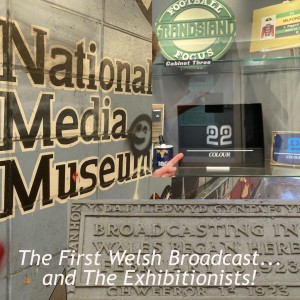


Monday Oct 03, 2022
#054 The First Welsh Broadcast... and The Exhibitionists!
Monday Oct 03, 2022
Monday Oct 03, 2022
Let Season 4 begin!
We pick up our timeline of the BBC origin story in February 1923 - and the launch of Cardiff 5WA, the first Welsh broadcast station.
Plus back in 2022: places you can go, museums, exhibitions and the like - from Bradford's National Science and Media Museum (and their Switched On exhibition) to St Bride's in London (and their A Kingdom of Cardboard exhibition). We chat to Lewis Pollard, curator of broadcasting at the first, and Bob Richardson, ex of BBC Presentation and Exhibitions departments, who's put together the latter.
They're great chats - and great exhibitions. Details on the links below.
Back in Wales, in the past, you'll hear some of the speeches delivered on launch night, from John Reith, Lord Gainford, Sir William Noble and the Lord Mayor of Cardiff. Fancy! Thanks Andrew Barker for sourcing the text, from newspapers of the day. We'll post the full text of the speeches on our Facebook group - again, link below.
SHOWNOTES:
St Bride's, London hosts A Kingdom of Cardboard, on till the end of 2022: https://sbf.org.uk/whats-on/view/a-kingdom-of-cardboard-2/
...see my pics of St Bride's A Kingdom of Cardboard exhibition here: https://twitter.com/BBCentury/status/1558125347614375936
Bradford's Switched On event is at the National Science and Media Museum, on till the start of 2023: https://www.scienceandmediamuseum.org.uk/whats-on/switched-on
...see my pics of Bradford's Switched On exhibition here: https://twitter.com/BBCentury/status/1571255160302702597
The BBC Heritage Collection is hosted at the Science Museum: https://collection.sciencemuseumgroup.org.uk/search/collection/bbc-heritage-collection
The 100 Objects of the BBC page: https://www.bbc.co.uk/historyofthebbc/bbc-100/100-objects/
Paul's tour of The First Broadcast: The Battle for the Beeb in 1922 has a few more dates left (and if not, you could book it for your place: www.paulkerensa.com/tour
Read the full speeches from the launch of Cardiff 5WA, as sourced by Andrew Barker, here on our Facebook page: https://tinyurl.com/ye3kswt9
Find us on the social medias at www.facebook.com/bbcentury and www.facebook.com/groups/bbcentury or on www.twitter.com/bbcentury
Paul's novel Auntie and Uncles will be out soon. More info will be on the mailing list: http://eepurl.com/M6Wbr
...or find Paul's existing books including Hark! The Biography of Christmas (https://amzn.to/3AZCzjf)
Like the podcast? Want to see it continue/thrive/grow? £5/mth on www.patreon.com/paulkerensa gets you extra behind-the-scenes videos - next will be another reading from Cecil Lewis' Broadcasting from Within, the first book on broadcasting. Thanks for £supporting!
We're nothing to do with the BBC - just talking about ye olde Auntie Beeb.
Enjoy!
Next time: The First Shakespeare on the BBC - and the BBC turns 100!
www.paulkerensa.com
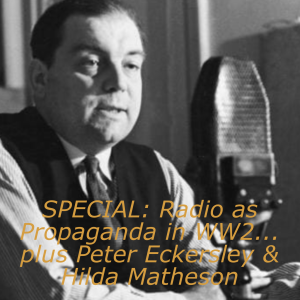


Tuesday Sep 13, 2022
Tuesday Sep 13, 2022
Tying up our 'summer' specials (now autumn), part 4 of 3 (whoops) is this special on radio as propaganda in World War 2. The non-BBC story.
Sefton Delmer sent black propaganda from near Bletchley Park into Germany, as Lord Haw-Haw did the opposite, sending radio propaganda from Germany back into Britain.
Meanwhile Hilda Matheson (remember her from two episodes ago?) was sending transmissions from the JBC - the Joint Broadcasting Committee - in Woburn Abbey, also near Bletchley Park. And somehow between here, there and everywhere, bouncing between Germany and Britain and across Europe, somehow involving MI5 and Ian Fleming, there's that man again... Peter Eckersley.
It's quite a tale, and here to bring it to you is Tim Wander (author of 2MT Writtle and From Marconi to Melba) and Edward Stourton (author of Auntie's War).
Plus with the passing of Queen Elizabeth II, we bring you the first broadcast from the most broadcast person in the world (I think) - aged 14, Princess Elizabeth on The Children's Hour in 1940.
Next episodes from here? Well it's the end of our summer specials, but the start of our centenary specials! The regular episodes in our 1923 timeline will return in the New Year. But first, a few episodes commemorating and celebrating 100 years of British broadcasting - including an episode on 100 Years in 100 Minutes... and for that we need you!
Record a short voice memo (20-40 seconds) on ANY element, moment, landmark or programme from the last 100 years. Send to me - paul at paulkerensa dot com. Be on our centenary special!
SHOWNOTES:
That full clip of Princess Elizabeth (before she was Queen) on The Children's Hour: https://youtu.be/VJI9LPFQth4
More of Lord Haw-Haw: https://youtu.be/Oe-THrWu_4I
Edward Stourton's book Auntie's War is available from your local independent bookshop, or online inc: https://amzn.to/3dTA6gX
Tim Wander's books include 2MT Writtle, available from some bookshops or online inc: https://amzn.to/3eEC8BX
My novel Auntie and Uncles will be out at an undisclosed date. To find out when or for latest info, join my mailing list for updates: http://eepurl.com/M6Wbr
...or find my existing books including Hark! The Biography of Christmas (https://amzn.to/3AZCzjf)
Want to read more about WW2 radio propaganda? There's an interesting article on other rogue broadcasters here: https://www.history.com/news/6-world-war-ii-propaganda-broadcasters
If you like the episode, share it! It all helps get this project out there. This is run by just one person - so EVERYTHING helps.
If you like the podcast enough to want to support it, help it continue, £5/mth on www.patreon.com/paulkerensa gets you extra behind-the-scenes videos - including a few extra readings from old books on the BBC in World War 2. Thanks for £supporting - it honestly keeps us going.
We're on www.facebook.com/bbcentury and www.twitter.com/bbcentury
We're nothing to do with the BBC - just talking about how twas.
Next time: Museums, Exhibitions and Events celebrating 100 years of British broadcasting... (know of one? Let us know and we'll feature it!)



Tuesday Aug 30, 2022
#052 SPECIAL: Auntie’s War - with Edward Stourton
Tuesday Aug 30, 2022
Tuesday Aug 30, 2022
The BBC in WW2 is our focus for the third of our summer specials - longer-form chats with brilliant authors and their take on a century of British broadcasting.
This time meet Auntie's War author and BBC presenter (Today, Sunday, The World at One, and plenty more), Edward Stourton. We can only ever scratch the surface in half an hour (what, no John Snagge?) - but it's a helicopter view of the key moments, from Munich to victory marches in Italy. Discover why reporting from Dunkirk to D-Day differed so much, and which BBC reporter gained notoriety for treating a war report like a football commentary.
Hear tales (and clips) of Edward R Murrow, Guy Byam, George Orwell (no clip there alas), J.B. Priestley, Charles Gardner, Winston Churchill.
Professor David Hendy joins us too to shine a light on a forgotten figure of D-Day: Mary Lewis, a BBC duplicator.
(There's a supplementary episode too, next time - on the flipside of broadcasting in WW2: black propaganda, as programmes were sent from Germany to Britain by Lord Haw-Haw and co, or from Britain to Germany by Sefton Delmer and co... and somehow involved in both, was our favourite radio pioneer, Peter Eckersley - next time!)
SHOWNOTES:
Edward Stourton's book Auntie's War is available from your local independent bookshop, or online inc: https://amzn.to/3dTA6gX
David Hendy's book The BBC: A People's History is available from your local independent bookshop, or online inc: https://amzn.to/3TnsX8Z
Our previous summer specials included authors Sarah-Jane Stratford (https://amzn.to/3CHhFqk) and Stephen Bourne (https://amzn.to/3ARHoKf)
Join my mailing list for updates on my forthcoming novel Aunties and Uncles: http://eepurl.com/M6Wbr
...or find my existing books including Hark! The Biography of Christmas (https://amzn.to/3AZCzjf)
Be on our centenary special! '100 Years in 100 Minutes'. Pick a moment (the start of television? The final Top of the Pops?), a programme (Python? Grandstand?), or a year of broadcasting history, record yourself talking about it for 20-60sec, and send it to me: paul at paulkerensa dot com (spelt out to dodge the spambots!). I'd love to get lots of different voices on that episode, and who better than the voices of listeners! Go on. Send something in.
If you like the episode, share it! It all helps get this project out there.
If you like the podcast enough to want to support it, help it continue, £5/mth on www.patreon.com/paulkerensa gets you extra behind-the-scenes videos, written updates, filmed walking tours of broadcasting heritage sites, readings from the first ever book on broadcasting... and anything else you'd like. You request, I'll see what I can do! Thanks for £supporting - it keeps me in books and web hosting.
We're on www.facebook.com/bbcentury and www.twitter.com/bbcentury
We're nothing to do with the BBC - just talking about how they used to be.
Next time: More WW2 broadcasting tales from Auntie's War author Edward Stourton, plus author of 2MT Writtle Tim Wander, on black propaganda. It's quite a tale... Stay subscribed to hear it!
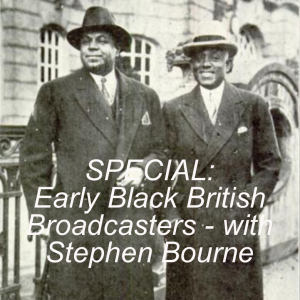


Monday Aug 08, 2022
#051 SPECIAL: Early Black British Broadcasters - with Stephen Bourne
Monday Aug 08, 2022
Monday Aug 08, 2022
How many pre-WW2 black British broadcasters can you name?
We’ll let's change that after this episode: summer special no.2 from The British Broadcasting Century...
EARLY BLACK BRITISH BROADCASTERS - WITH STEPHEN BOURNE
Author and social historian Stephen Bourne specialises in black heritage, and joins us to inform, educate and entertain us about people of colour on air between the wars.
I first encountered Stephen’s work when I spotted Evelyn Dove’s scrapbook in the BBC100 ‘Objects of the BBC’ season. Stephen owns her archive, and was keen to chat about some of the early black stars of British broadcasting.
You'll hear about:
Layton and Johnstone, Lawrence Brown, Paul Robeson, Marion Anderson, Evelyn Dove, The Kentucky Minstrels, Scott and Whaley (aka Pussyfoot and Cuthbert), Elisabeth Welch, Una Marson, Ken Snakehips Johnson, Adelaide Hall... and more.
Separately, you’ll also hear a song from singer Kathie Touin – a new exclusive version of one of the earliest songs about wireless: ‘There’s a Wireless Station Down in My Heart’. Thanks Graham Brown and Kathie Touin for arranging, performing and sending! Details of her album below...
SHOWNOTES:
Stephen Bourne’s books are available at stephenbourne.co.uk/books/ and include ‘Deep are the Roots: Trailblazers who Changed Black British Theatre’, ‘Evelyn Dove: Britain’s Black Cabaret Queen’, ‘Black in the British Frame: The Black Experience in British Film and Television’ and ‘Under Fire: Black Britain in Wartime 1939-45’. Do grab a book and read more on this – plenty more stories to discover.
Kathie Touin’s website has more on her albums and singles: www.kathietouin.com. Kathie's lockdown single was ‘This Time (Save the World?): https://www.youtube.com/watch?v=kToCUypZWic Thanks Kathie!
See/hear a clip of Una Marson from West Indies Calling – well worth a watch: https://youtu.be/ViGwxJloI70
I told a tale of broadcasting history on the proper BBC this week: a Pause for Thought for Zoe Ball’s Radio 2 Breakfast Show on 100 years since the first religious broadcast. Have a listen: https://www.bbc.co.uk/sounds/play/p0cr3ghj
If you like the episode, share it! It all helps get this project out there.
If you like the podcast enough to want to support it, help it continue, £5/mth on www.patreon.com/paulkerensa gets you extra behind-the-scenes videos, written updates, filmed walking tours of broadcasting heritage sites, readings from the first ever book on broadcasting... and anything else you'd like. You request, I'll see what I can do! Thanks for £supporting - it keeps me in books and web hosting.
We're on www.facebook.com/bbcentury and www.twitter.com/bbcentury
We're nothing to do with the BBC - just talking about how they used to be.
One more author special next time: The BBC in WW2: Auntie’s War with Edward Stourton. Then the timeline continues - Feb 1923 at the early Beeb...
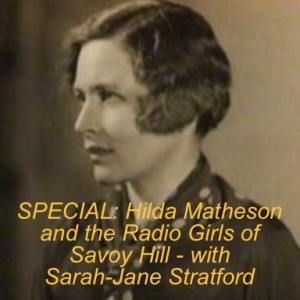


Monday Jul 25, 2022
Monday Jul 25, 2022
Summer special time!
The first of three episodes outside of our era, our regular timeline we're telling of the early BBC. Instead we leap from 1923 to 1926 and then some, to meet:
HILDA MATHESON AND THE RADIO GIRLS OF SAVOY HILL
...Your guide is Sarah-Jane Stratford - novelist behind Radio Girls. It's a wonderfully evocative book, and a great summer read. Get your copy now!
We talk about Hilda Matheson's legacy, from first Director of Talks, to her relationship with Vita Sackville-West, to Hilda's positive influence on the BBC in dark times during the build-up to World War Two.
If you like the episode, share it! It all helps get this project out there.
I mention a walking video I did for the Patreon connoisseurs - matrons and patrons can see it here: https://www.patreon.com/posts/68777192 - and do consider joining up, as your few quid will help keep the podcast going.
We're on www.facebook.com/bbcentury and www.twitter.com/bbcentury
We're nothing to do with the BBC - just talking about how they used to be.
Next time: The earliest black British broadcasters, with Stephen Bourne.
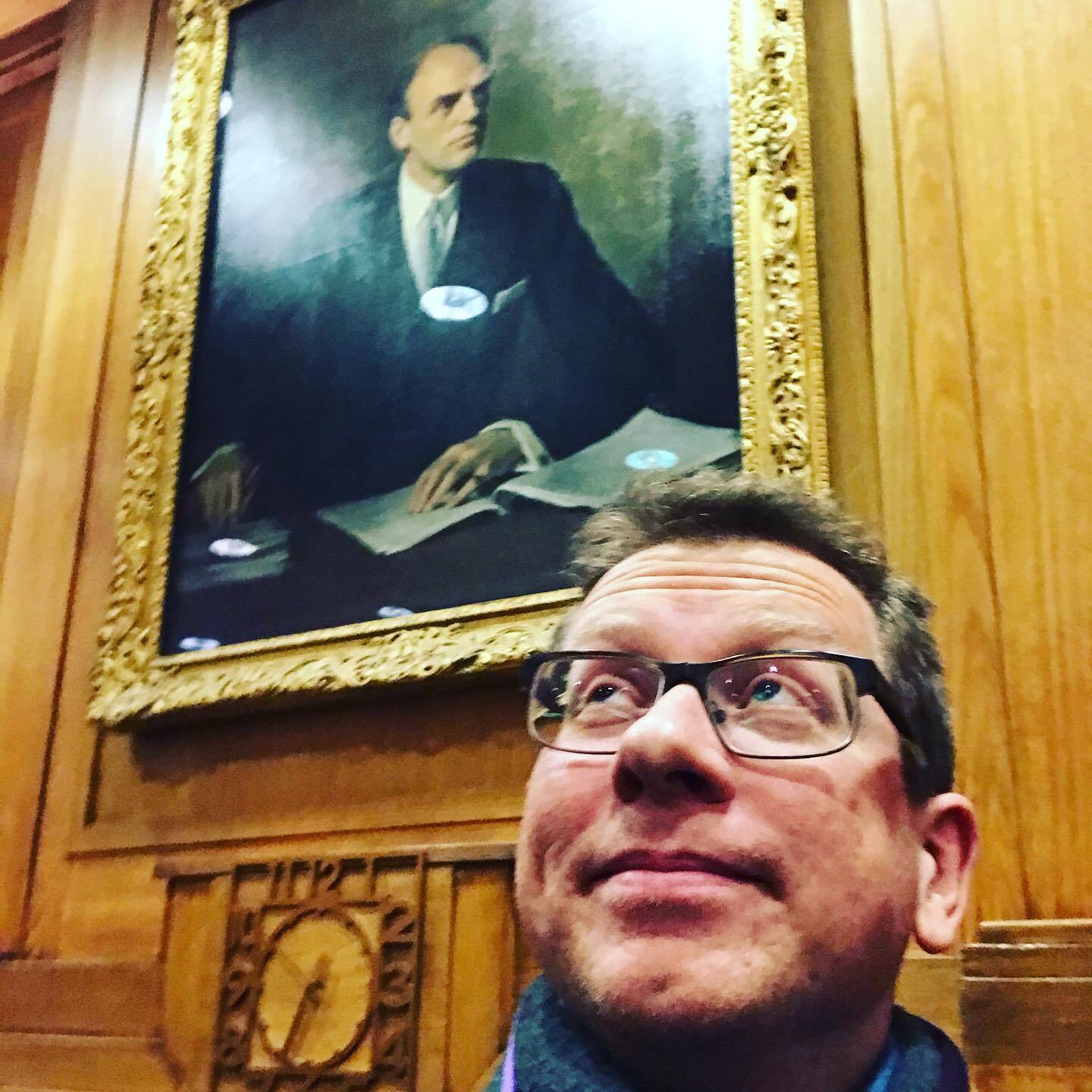
About this project
This is a 3-part project (at least)...
THE BOOK:
Intended as a trilogy, Auntie and Uncles comes out in 2023. Book 1 tells the BBC tale up to its launch, from the perspectives of four pioneers: Arthur Burrows, Peter Eckersley, Hilda Matheson and John Reith. Matheson only joins the BBC later - but she's somehow on hand for some key moments in British history. And she's awesome, so I had to include her.
But in researching the book, I was looking for a podcast about early broadcasting. I couldn't find one, so...
THE PODCAST:
When the pandemic hit, and my live performing work went, I saw the centenary approaching of Melba's famous 1920 broadcast. Not famous enough it seemed - I couldn't see anyone talking about it. No radio shows, no TV documentaries, and certainly no podcasts. So I started The British Broadcasting Century. The more I kept digging, the more stories I found, the more characters needing their day in the sun, the more old clips in need of rescue and a new audience... so here we are. And it's still growing. We've taken 50 episodes to reach the start of 1923. A LOT of stories to tell. The slow way. With a podcast, you can.
THE SHOW:
In 2022, for centenary year, I toured a show - The First Broadcast: The Battle for the Beeb in 1922. I'm a comedian, but wanted to put on a one-man show that told this story via two characters, Arthur Burrows and Peter Eckersley. It wasn't intended as a comedy. It came across that way, a bit.
That show's in storage for now, but ready to be dusted down if anyone wants it.
Meanwhile I have two other potential shows/talks: Auntie's First Year (a presentation on the landmarks of 1923) and The First Religious Broadcast (a re-enactment of what led to and what happened at Britain's first ever broadcast sermon, pre-BBC, in the summer of 1922).
Interested in either? Book me. Paul at paulkerensa dot com.
And buy the book.
More info on all this at paulkerensa.com/oldradio
Thanks for stopping by. Keep listening.


